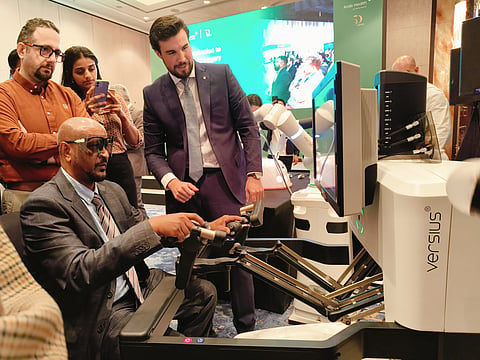Arab Health 2025: Why robot-assisted surgeries are rising in UAE
Designed for assistance, they won’t replace human doctors, experts say

Dubai: Robotic-assisted surgery (RAS) is becoming more commonplace in hospitals across the UAE, with hundreds of procedures being performed annually, according to leading experts.
Involving smaller incisions, RAS enhances precision, reduces recovery time, and improves patient outcomes, allowing patients to return to their normal lives more quickly.
American Hospital Dubai, one of the early adopters of RAS in the region, has conducted more than 2,000 robot-assisted surgeries since 2020, averaging about 500 per year.
“Currently, robotics are up to 20 per cent of all surgeries,” Dr Jado Kamal, specialist in general surgery and clinical instructor in the robotic programme at the hospital, told Gulf News.
Holding a workshop during the ongoing Arab Health exhibition in Dubai, Dr Kamal explained how the use of the da Vinci Surgical System and the CMR Surgical System, called Versius, are becoming game-changers in medical care.
“The future is robotics surgery across all specialties. It's minimally invasive, ensures less pain and shorter stay in hospital.”
At the workshop, the hospital gave visitors the opportunity to try their hands at controlling the console while wearing 3D glasses, as three robotic arms worked on a dummy model of an abdomen.
“You need to have good experience and training as a surgeon in laparoscopic surgeries before advancing to robotics,” Dr Kamal said, pointing out that robots won’t replace human doctors.
"This robotic system is an assisted technique for the surgeon. It won’t work alone, which means it is not a replacement for a human surgeon."
Groundbreaking surgeries
Dr Shafik Sidani, section head of colon and rectal surgery and the director of robotic surgery at the Digestive Disease Institute at Cleveland Clinic Abu Dhabi, noted that surgeons can now perform more complex cancer surgeries, organ transplants, lung and chest operations, and abdominal wall reconstructions among others.
“The use of robotic techniques has allowed us to perform groundbreaking surgeries, including organ transplantations where both the kidney donor and recipient underwent robotic procedures minimally invasively. Additionally, we achieved significant milestones, including the first robotic mastectomy in the UAE and the region,” he said.
Dr Sidani revealed that the hospital performed more than 400 robotic surgical cases in 2024.
“These are not minor robotic interventions but highly advanced and complex procedures that would typically require traditional surgical methods with longer recovery times,” Dr Sidani noted.
Heavy demand
Meanwhile, Dr Jafaru Abu, consultant gynaecological oncology surgeon at Burjeel Medical City, Abu Dhabi, said the number of experts in robot surgeries is surging at the hospital.
“In August 2023, we launched our robotic programme with just one da Vinci-certified robot surgeon. Now, we have more than 15 surgeons certified across all our surgical specialties,” he added.
To date, the hospital has completed more than 470 robotic surgeries.
“Most of them were complex cases,” Dr Abu said and noted that the da Vinci robotic system has “significantly improved” operative efficiency through comprehensive staff training and system familiarity.
“We continue to train more surgeons, aiming to reach around 1,000 cases by the end of 2025. Our goal is to be in a position to consider acquiring another robot in 2026, having maximised the utilisation of our current system by then,” Dr Abu added.



